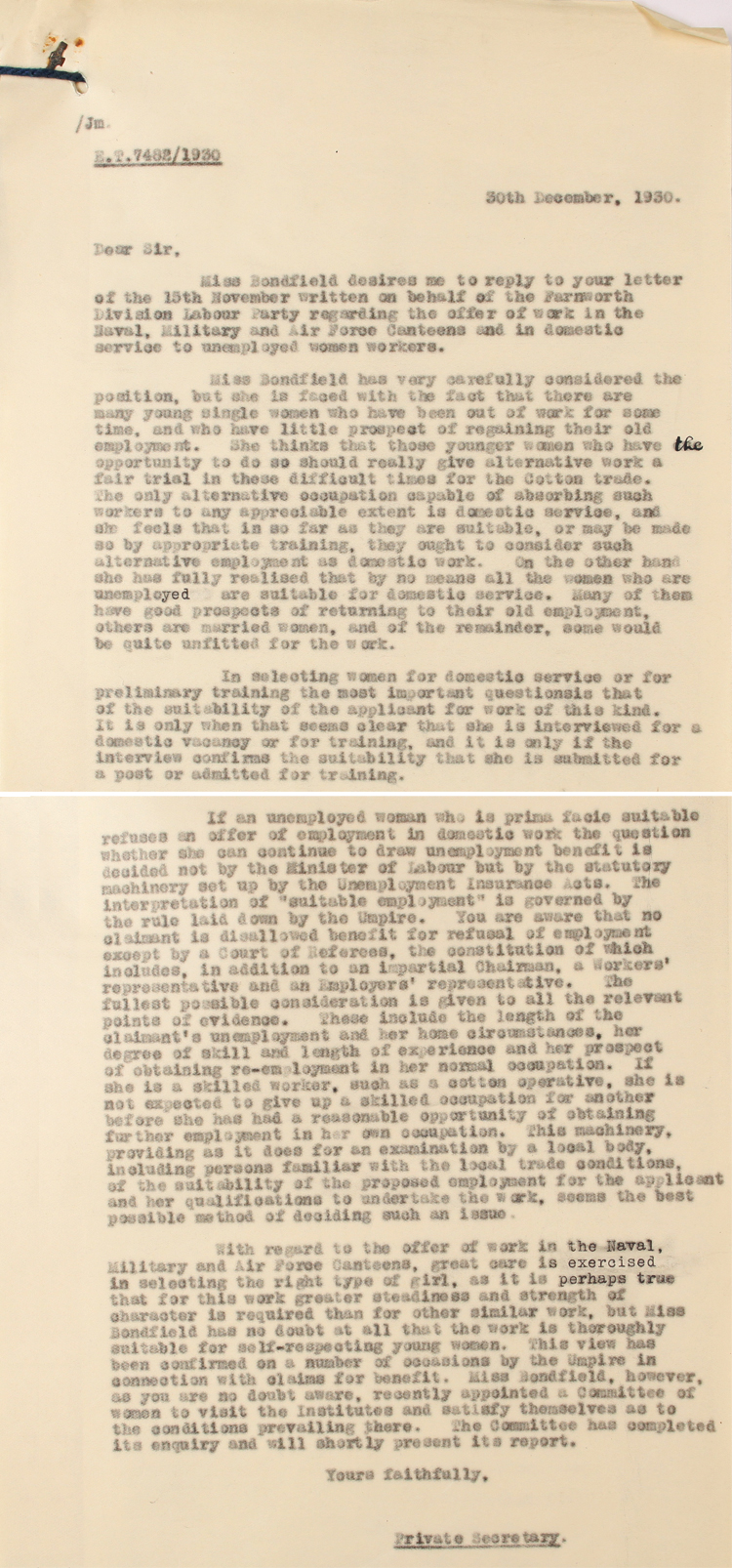
Letter to the Farnworth Labour Party on behalf of Margaret Bondfield, Minister of Labour, 30th December 1930 regarding unemployed women (LAB 2/1344/ET7560/1930)
Margaret Bondfield was Britain’s first female Cabinet Minister.
Transcript
30th December, 1930.
Dear Sir,
Miss Bondfield desires me to reply to your letter of the 13th December written on behalf of the Farnworth Division Labour Party regarding the offer of work in the Naval, Military and Air Force Canteens and in domestic service [working as servants] to unemployed women workers.
Miss Bondfield has very carefully considered the position, but she is faced with the fact that there are many young single women who have been out of work for some time, and who have little prospect of regaining their old employment. She thinks that those younger women who have the opportunity to do so should really give alternative work a fair trial in these difficult times for the cotton trade. The only alternative occupation capable of absorbing such workers to any appreciable extent is domestic service, and she feels that in so far as they are suitable or may be made so by appropriate training, they ought to consider such alternative employment as domestic work. On the other hand she has fully realised that by no means all the women who are unemployed are suitable for domestic service. Many of them have good prospects of returning to their old employment, others are married women, and of the reminder, some would be quite unfitted for the work.
In selecting women for domestic service or for preliminary training the most important question is that of suitability of the applicant for work of this kind. It is only when that seems clear that she is interviewed for a domestic vacancy or for training, and it is only if the interview confirms the suitability that she is submitted for a post or admitted for training.
If an unemployed woman who is prima facie [at first sight] suitable refuses an offer of employment in domestic work the question whether she can continue to draw unemployment benefit is decided not by the Minister of Labour but by the statutory machinery set up by the Unemployment Insurance Acts. The interpretation of “suitable employment” is governed by the rule laid down by the Umpire. You are aware that no claimant is disallowed benefit for refusal of employment except by a Court of Referees, the constitution of which includes, in addition to an impartial Chairman, a Workers’ representative and an Employers’ representative. The fullest possible consideration is given to all relevant points of evidence. These include length of the claimant’s unemployment and her home circumstances, her degree of skill and length of experience and her prospect of gaining re-employment in her normal occupation. If she is a skilled worker, such as a cotton operative, she is not expected to give up a skilled occupation for another before she has had a reasonable opportunity of obtaining further employment in her own occupation. This machinery, providing as it does for an examination by a local body, including persons familiar with the local trade conditions of the suitability of the proposed employment for the applicant and her qualifications to undertake the work, seems the best possible method of deciding such an issue.
With regard to the offer of work in the Naval, Military and Air Force Canteens, great care is exercised in selecting the right type of girl, as it is perhaps true that for this work greater steadiness and strength of character is required than for other similar work, but Miss Bondfield has no doubt at all that the work is thoroughly suitable for self-respecting young women. This view has been confirmed on a number of occasions by the Umpire in connection with claims for benefit. Miss Bondfield, however, as you are no doubt aware, recently appointed a Committee of women to visit the Institutes and satisfy themselves as to the conditions prevailing there. The Committee has completed its enquiry and will shortly present its report.
Yours faithfully,
Private Secretary
